Adafruit ESP8266 Feather
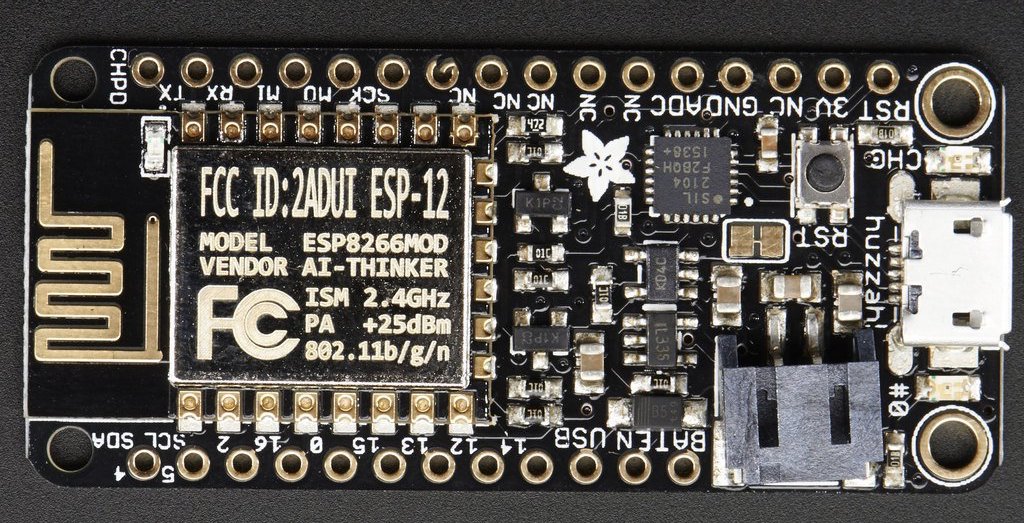
Features
Cpp-Client
These are the SDK features that are currently available on the Adafruit ESP8266 Feather board.
API
| Blocks | Supported |
|---|---|
get(const char* const blockId) | ✅ |
all(int limit, int page) | ✅ |
transactions(const char* const blockId) | ✅ |
search(const std::map<std::string, std::string>& bodyParameters, int limit, int page) | ✅ |
| Delegates | Supported |
|---|---|
get(const char *const identifier) | ✅ |
all(int limit, int page) | ✅ |
blocks(const char *const identifier, int limit, int page) | ✅ |
voters(const char *const identifier, int limit, int page) | ✅ |
| Node | Supported |
|---|---|
configuration() | ✅ |
status() | ✅ |
syncing() | ✅ |
| Peers | Supported |
|---|---|
get(const char* const ip) | ✅ |
all(int limit, int page) | ✅ |
| Transactions | Supported |
|---|---|
getUnconfirmed(const char* const identifier) | ✅ |
get(const char* const identifier) | ✅ |
all(int limit, int page) | ✅ |
allUnconfirmed(int limit, int page) | ✅ |
types() | ✅ |
search(const std::map<std::string, std::string>& body_parameters, int limit, int page) | ✅ |
| Votes | Supported |
|---|---|
get(const char* const identifier) | ✅ |
all(int limit, int page) | ✅ |
| Wallets | Supported |
|---|---|
get(const char *const identifier) | ✅ |
all(int limit, int page) | ✅ |
top(int limit, int page) | ✅ |
transactions(const char *const identifier, int limit, int page) | ✅ |
transactionsReceived(const char *const identifier, int limit, int page) | ✅ |
transactionsSent(const char *const identifier, int limit, int page) | ✅ |
votes(const char *const identifier, int limit, int page) | ✅ |
search(const std::map<std::string, std::string> &bodyParameters, int limit, int page) | ✅ |
Cpp-Crypto
Configuration
| Fee: | Supported |
|---|---|
get(int type) | ✅ |
set(int type, uint64_t fee) | ✅ |
| Network: | Supported |
|---|---|
get() | ✅ |
set(const AbstractNetwork& network) | ✅ |
Enums
| Enums | Supported |
|---|---|
| Fees | ✅ |
| Types | ✅ |
Identities
| Address | Supported |
|---|---|
toBytes() | ✅ |
toString() | ✅ |
fromPassphrase(const char *const passphrase, uint8_t networkVersion) | ✅ |
fromPrivateKey(PrivateKey privateKey, uint8_t networkVersion) | ✅ |
fromPublicKey(PublicKey publicKey, uint8_t networkVersion) | ✅ |
validate(Address address, uint8_t networkVersion) | ✅ |
validate(const char *const addressStr, uint8_t networkVersion) | ✅ |
validate(const uint8_t *addressBytes, uint8_t networkVersion) | ✅ |
base58encode(const uint8_t *source) | ✅ |
bytesFromBase58Check(const char *const address) | ✅ |
| Mnemonic | Supported |
|---|---|
generate(size_t num_words = 12u, Language language) | ✅ |
| PrivateKey | Supported |
|---|---|
toBytes() | ✅ |
toString() | ✅ |
fromPassphrase(const char *const passphrase) | ✅ |
fromHex(const char *const privateKey) | ✅ |
fromWIFString(const char *wifStr, uint8_t wifByte) | ✅ |
validate(PrivateKey privateKey) | ✅ |
validate(const char *privateKeyStr) | ✅ |
validate(const uint8_t *privateKeyBytes) | ✅ |
| PublicKey | Supported |
|---|---|
toBytes() | ✅ |
toString() | ✅ |
isValid() | ✅ |
fromPassphrase(const char *const passphrase) | ✅ |
fromHex(const char *const publicKey) | ✅ |
fromPrivateKey(PrivateKey privateKey) | ✅ |
validate(PublicKey publicKey) | ✅ |
validate(const char *publicKeyStr) | ✅ |
validate(const uint8_t *publicKeyBytes) | ✅ |
| WIF | Supported |
|---|---|
toBytes() | ✅ |
toString() | ✅ |
fromPassphrase(const char *const passphrase, uint8_t wifByte) | ✅ |
Transactions
| Builder | Supported |
|---|---|
buildTransfer(std::string recipientId, uint64_t amount, std::string vendorField, std::string passphrase std::string secondPassphrase = "") | ✅ |
buildSecondSignatureRegistration(std::string passphrase, std::string secondPassphrase = "") | ✅ |
buildDelegateRegistration(std::string username, std::string passphrase, std::string secondPassphrase = "") | ✅ |
buildVote(std::vector<std::string> votes, std::string passphrase, std::string secondPassphrase = "") | ✅ |
buildMultiSignatureRegistration(uint8_t min, uint8_t lifetime, std::vector<std::string> keysgroup, std::string passphrase, std::string secondPassphrase = "") | ✅ |
| Deserializer | Supported |
|---|---|
deserialize() | ✅ |
| Serializer | Supported |
|---|---|
serialize() | ✅ |
| Transaction | Supported |
|---|---|
getId() | ✅ |
sign(const char* passphrase) | ✅ |
secondSign(const char* passphrase) | ✅ |
verify() | ❌ |
secondVerify(const char* secondPublicKey) | ❌ |
toBytes(bool skipSignature = true, bool skipSecondSignature = true) | ✅ |
Utils
| Message | Supported (unstable) |
|---|---|
sign(std::string newMessage, const char *const passphrase) | ✅ |
verify() | ❌ |
toArray() | ✅ |
toJson() | ✅ |
toString() | ✅ |
| Slot | Supported |
|---|---|
time(Crypto::Networks::AbstractNetwork network) | ❌ |
epoch(Crypto::Networks::AbstractNetwork network) | ❌ |
Specs
These are the specifications for the Adafruit ESP8266 Feather board.
This is the Adafruit Feather HUZZAH ESP8266 - our take on an 'all-in-one' ESP8266 WiFi development board with built in USB and battery charging. Its an ESP8266 WiFi module with all the extras you need, ready to rock!
At the Feather HUZZAH's heart is an ESP8266 WiFi microcontroller clocked at 80 MHz and at 3.3V logic. This microcontroller contains a Tensilica chip core as well as a full WiFi stack. You can program the microcontroller using the Arduino IDE for an easy-to-run Internet of Things core. We wired up a high-quality SiLabs CP2104 USB-Serial chip that can upload code at a blistering 921600 baud for fast development time. It also has auto-reset so no noodling with pins and reset button pressings. The CP2104 has better driver support than the CH340 and can do very high speeds without stability issues.
To make it easy to use for portable projects, we added a connector for any of our 3.7V Lithium polymer batteries and built in battery charging. You don't need a battery, it will run just fine straight from the micro USB connector. But, if you do have a battery, you can take it on the go, then plug in the USB to recharge. The Feather will automatically switch over to USB power when its available.
- Measures 2.0" x 0.9" x 0.28" (51mm x 23mm x 8mm) without headers soldered in
- Light as a (large?) feather - 9.7 grams
- ESP8266 @ 80MHz with 3.3V logic/power
- 4MB of FLASH (32 MBit)
- Built in WiFi 802.11 b/g/n
- 3.3V regulator with 500mA peak current output
- CP2104 USB-Serial converter onboard with 921600 max baudrate for speedy uploading
- Auto-reset support for getting into bootload mode before firmware upload
- 9 x GPIO pins - can also be used as I2C and SPI
- 1 x analog inputs 1.0V max
- Built in 100mA LiPoly charger with charging status indicator LED, can also cut a trace to disable the charger
- Pin #0 red LED for general purpose blinking. Pin #2 blue LED for bootloading debug & general purpose blinking
- Power/enable pin
- 4 mounting holes
- Reset button
Pinout
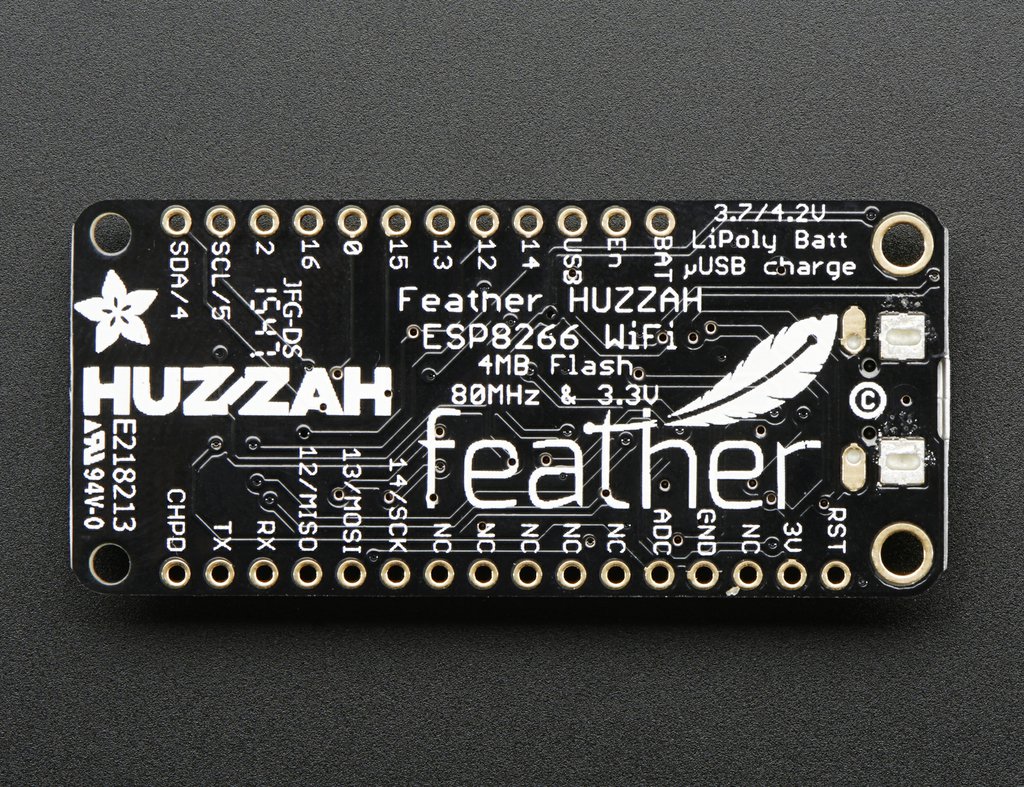
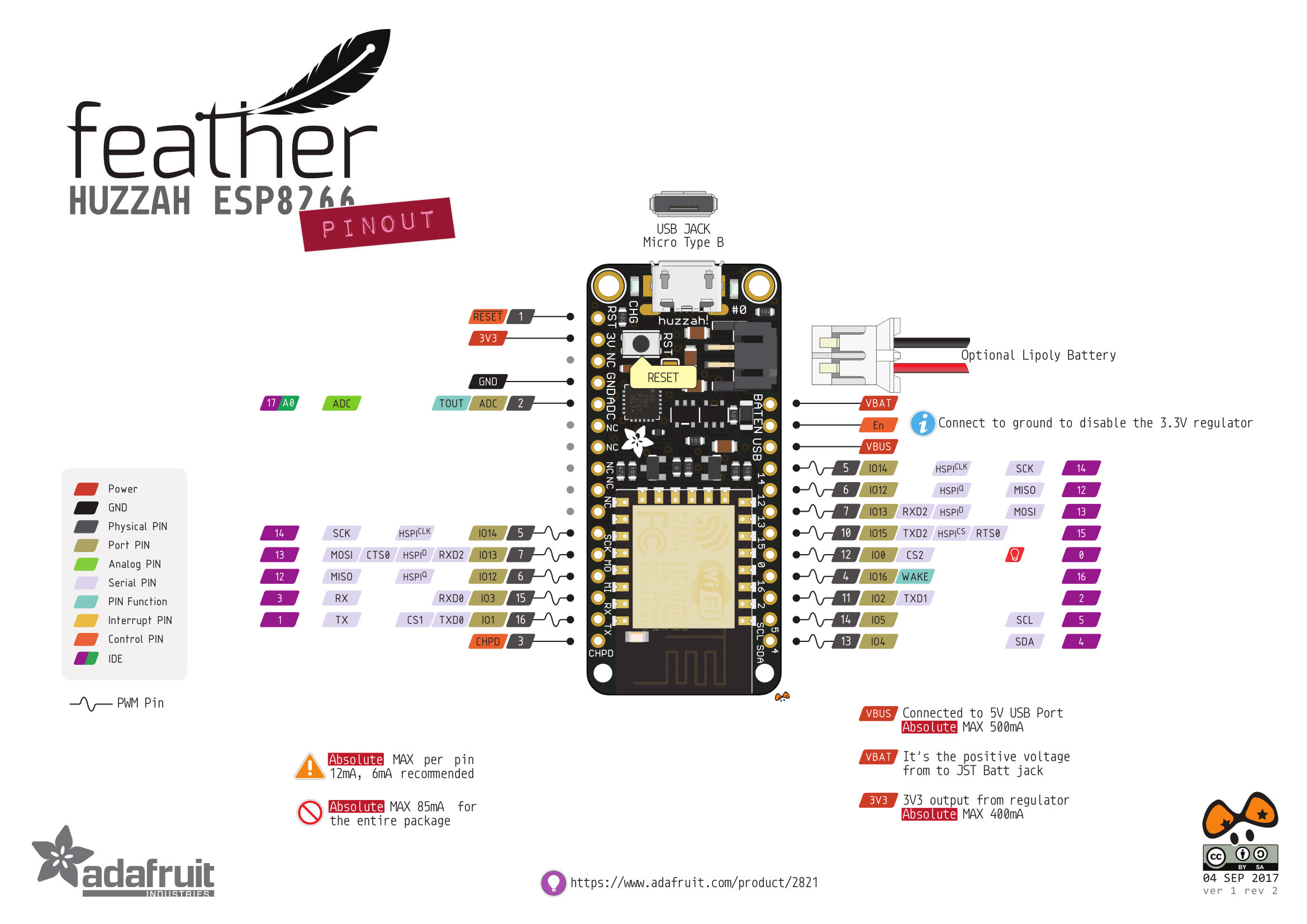
External Resources
- Adafruit Feather Huzzah ESP8266: Overview
- How To: Up and Running with Adafruit HUZZAH Feather ESP8266
- espressif ESP8266 SDK's and Demos
- ESP 8266 Non-OS SDK API Reference (PDF)
Troubleshooting
Setup
These are the steps to setup your Adafruit ESP8266 Feather board.
1. Add ESP8266 to the Arduino IDE
To add ESP8266 to the Arduino IDE, use 'Additional Boards Manager URL's' in 'Preferences'; this is a line separated list of hardware configuration JSON configs.
Preferences >> Additional Boards Manager URL's
Add this line to the URL's list:
http://arduino.esp8266.com/stable/package_esp8266com_index.json
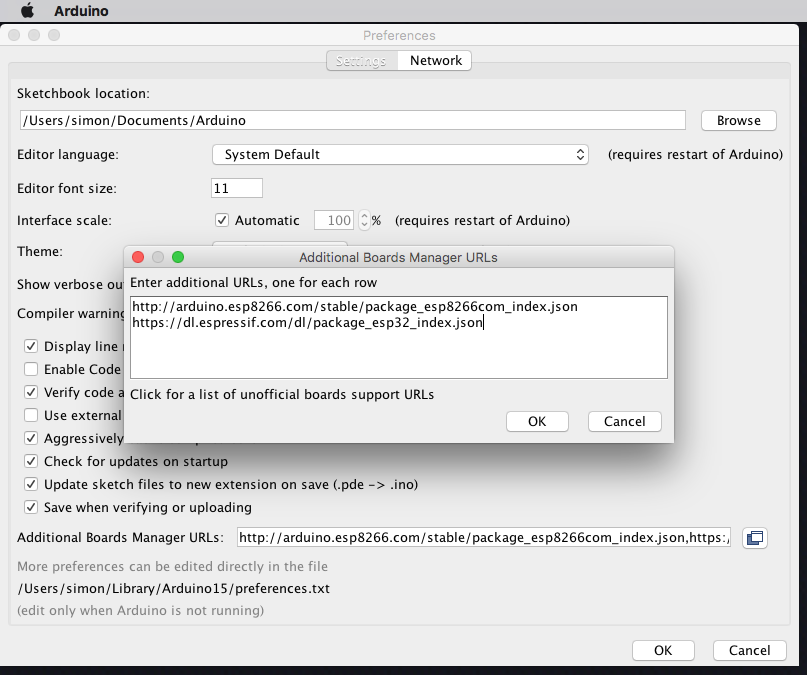
2. Download the ESP8266 packages via Board Manager
Open the Boards Manager from the Tools dropdown menu:
Tools >> Board >> Boards Manager
Search for and install the 'ESP8266' package in Boards Manager.
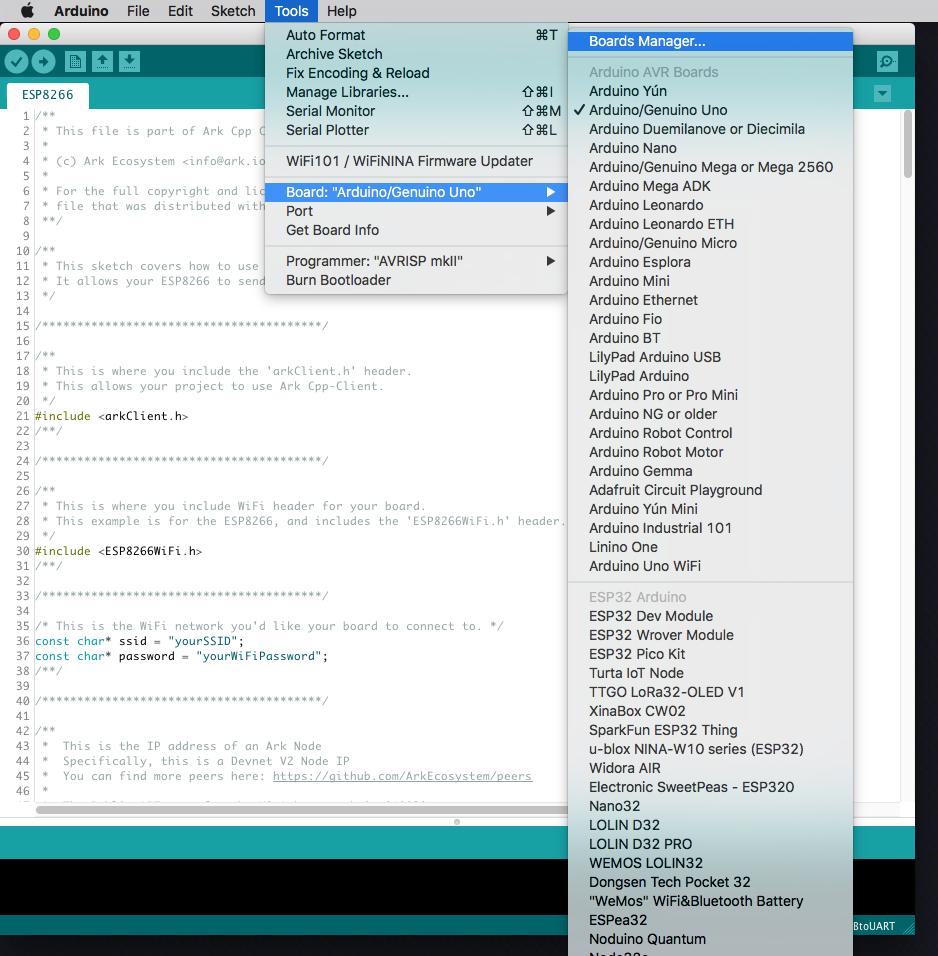
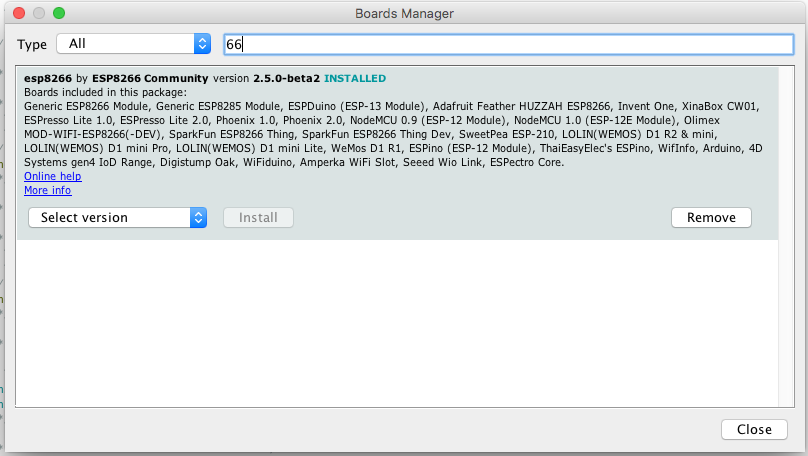
3. Select your Board
From the Tools dropdown menu:
Tools >> Board
Select the Adafruit ESP32 Feather board
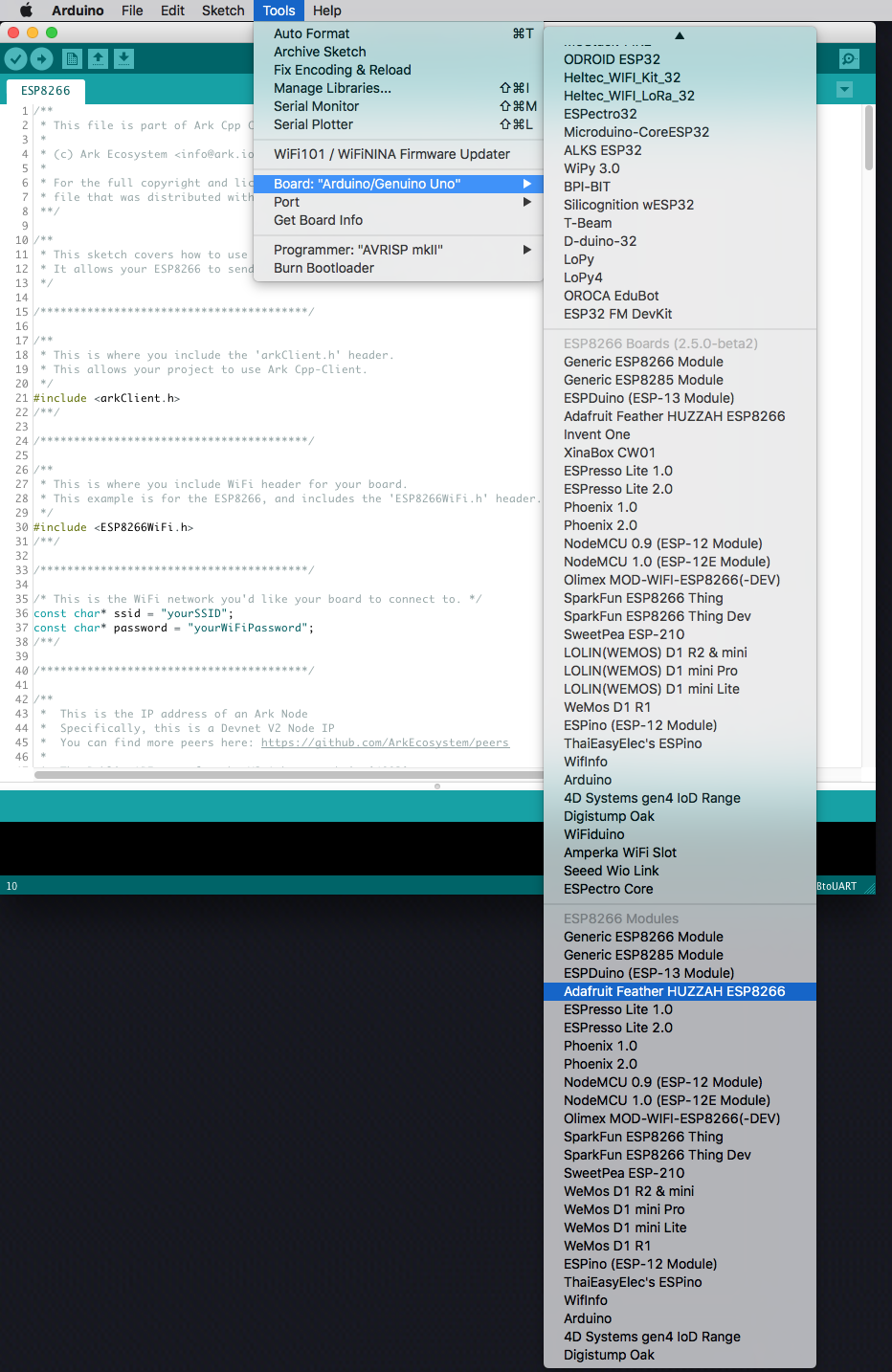
4. Install the USB driver
For your system to be able to talk to the ESP8266 via USB, you will also need to install the SiLabs CP2104 Driver.
You can download the zip file for your operating system from the following website:
https://www.silabs.com/products/development-tools/software/usb-to-uart-bridge-vcp-drivers
e.g.
- Linux_3.x.x_4.x.x_VCP_Driver_Source.zip
- Mac_OSX_VCP_Driver.zip
- CP210x_VCP_Windows.zip
Unzip the downloaded file and run the installation package inside the unzipped folder.
Example
Pictures of an installation process of the CP2104 USB Driver for macOS systems can be found here.
Examples
Client - Arduino Sketch
ESP8266.ino
/**
* This file is part of Swipechain Cpp Client.
*
* (c) Swipechain <info@swipechain.org>
*
* For the full copyright and license information, please view the LICENSE
* file that was distributed with this source code.
**/
/**d
* This sketch covers how to use the Cpp-Client API.
* It allows your ESP8266 to send requests to an Swipechain Node
*/
/**
* NOTE: At the time of this writing, the Cpp-Client library requires running the 'ARDUINO_IDE.sh' bash script located in the 'extras' folder.
* This converts our library to be compatible with the Arduino IDE.
*/
/****************************************/
/**
* This is where you include the 'arkClient.h' header.
* This allows your project to use Swipechain Cpp-Client.
*/
#include <arkClient.h>
/**/
/****************************************/
/**
* This is where you include WiFi header for your board.
* This example is for the ESP8266, and includes the 'ESP8266WiFi.h' header.
*/
#include <ESP8266WiFi.h>
/**/
/****************************************/
/* This is the WiFi network you'd like your board to connect to. */
const char* ssid = "yourSSID";
const char* password = "yourWiFiPassword";
/**/
/****************************************/
/**
* This is the IP address of an Swipechain Node
* Specifically, this is a Devnet V2 Node IP
* You can find more peers here: https://github.com/SwipeChain/peers
*
* The Public API port for the V2 Swipechain network is '4003'
*/
const char* peer = "167.114.29.55";
int port = 4003;
/**/
/****************************************/
/**
* This is how you define a connection while speficying the API class as a 'template argument'
* You instantiate a connection by passing a IP address as a 'c_string', and the port as an 'int'.
*/
Swipechain::Client::Connection<Swipechain::Client::Api> connection(peer, port);
/**/
/****************************************/
void checkAPI() {
/**
* This is how you can check the Version of the API
* In this example, it should return '2' as an 'int' for V2 of Swipechains' API.
*/
auto apiVersion = connection.api.version();
Serial.print("\nAPI Version: ");
Serial.println(apiVersion);
/**/
/********************/
/**
* Here you can call a list of 'All' 'Blocks' on the network.
* The '2' and '1' refer to the pagination (e.g. response limit and how many pages)
*
* This is equivalant to calling '167.114.29.49:4003/api/v2/blocks?limit=2&page=1'
*
* The response should be a json-formatted object
* The "pretty print" version would look something like this
*
* {
* "meta": {
* "count": 2,
* "pageCount": 597291,
* "totalCount": 1194581,
* "next": "\/api\/v2\/blocks?limit=2&page=2",
* "previous": null,
* "self": "\/api\/v2\/blocks?limit=2&page=1",
* "first": "\/api\/v2\/blocks?limit=2&page=1",
* "last": "\/api\/v2\/blocks?limit=2&page=597291"
* },
* "data": [
* {
* "id": "9809002764916365223",
* "version": 0,
* "height": 1178071,
* "previous": "10476150126412446830",
* "forged": {
* "reward": 200000000,
* "fee": 0,
* "total": 200000000,
* "amount": 0
* },
* "payload": {
* "hash": "e3b0c44298fc1c149afbf4c8996fb92427ae41e4649b934ca495991b7852b855",
* "length": 0
* },
* "generator": {
* "username": "darkcrow",
* "address": "DFSUsSmcVUhVZYQ1nowciWmmtnj1kvZK5Z",
* "publicKey": "03a8ff0a3cbdcb3bfbdb84dbf83226f338ba1452047ac5b8228a1513f7f1de80de"
* },
* "signature": "304402207fd861e98aa5e4ea0c4a828ad9104bb636b429bc73dc0d5bfe3515347e8b1a79022051f8fb3b3752f1204e8c425d0528203942756811d669c7dd1ccb15ff7bc14e09",
* "transactions": 0,
* "timestamp": {
* "epoch": 57144626,
* "unix": 1547245826,
* "human": "2019-01-11T22:30:26.000Z"
* }
* },
* {
* "id": "10476150126412446830",
* "version": 0,
* "height": 1178070,
* "previous": "1656548224477584335",
* "forged": {
* "reward": 200000000,
* "fee": 0,
* "total": 200000000,
* "amount": 0
* },
* "payload": {
* "hash": "e3b0c44298fc1c149afbf4c8996fb92427ae41e4649b934ca495991b7852b855",
* "length": 0
* },
* "generator": {
* "username": "genesis_16",
* "address": "DHg1jYVS23D6GP7RuhckuJsYAr6crH6c3Z",
* "publicKey": "03c57b6a3eb7d01ade51f95c8ae4e8ebeb7ca7b8422ab0fb2a236de5d1a5bc6a1b"
* },
* "signature": "304402201e548ee45d835a7edda9cddbe26530563c1aceebbb25ebf89966eed8fec5d0e40220140aee033d42562b22c73f097249e9a59cef24a2a7e1c887c7a16691445c2987",
* "transactions": 0,
* "timestamp": {
* "epoch": 57144618,
* "unix": 1547245818,
* "human": "2019-01-11T22:30:18.000Z"
* }
* }
* ]
* }
*
*/
const auto blocksResponse = connection.api.blocks.all(2, 1);
Serial.print("\nBlocks Response: ");
Serial.println(blocksResponse.c_str()); // The response is a 'std::string', to Print on Arduino, we need the c_string type.
/**/
/********************/
/**
* The following method can be used to search for a speficit Delegate.
* In this case, 'boldninja'.
*
* This is equivalant to calling '167.114.29.49:4003/api/v2/delegates/boldninja'
*
* The response should be a json-formatted object
* The "pretty print" version would look something like this:
*
* {
* "data": {
* "username": "boldninja",
* "address": "DKrACQw7ytoU2gjppy3qKeE2dQhZjfXYqu",
* "publicKey": "023ee98f453661a1cb765fd60df95b4efb1e110660ffb88ae31c2368a70f1f7359",
* "votes": 4970515580299,
* "rank": 27,
* "blocks": {
* "produced": 23867,
* "missed": 439,
* "last": {
* "id": "13492733628654518284",
* "height": 1178126,
* "timestamp": {
* "epoch": 57145090,
* "unix": 1547246290,
* "human": "2019-01-11T22:38:10.000Z"
* }
* }
* },
* "production": {
* "approval": 0.04,
* "productivity": 98.19
* },
* "forged": {
* "fees": 103507430299,
* "rewards": 4731200000000,
* "total": 4834707430299
* }
* }
* }
*/
const auto delegateResponse = connection.api.delegates.get("boldninja");
Serial.print("\nDelegate Response: ");
Serial.println(delegateResponse.c_str()); // The response is a 'std::string', to Print on Arduino, we need the c_string type.
/**/
/********************/
/**
* The following method can be used to get the Status of a Node.
*
* This is equivalant to calling '167.114.29.49:4003/api/v2/node/status'
*
* The response should be a json-formatted object
* The "pretty print" version would look something like this:
*
* {
* "data": {
* "synced": true,
* "now": 1178395,
* "blocksCount": 0
* }
* }
*/
const auto nodeStatus = connection.api.node.status();
Serial.print("\nNode Status: ");
Serial.println(nodeStatus.c_str()); // The response is a 'std::string', to Print on Arduino, we need the c_string type.
/**/
/********************/
/**
* The following method can be used to get a list of 'All' 'Peers' on the network.
*
* The '2' and '1' refer to the pagination (e.g. response limit and how many pages)
*
* This is equivalant to calling 'http://167.114.29.49:4003/api/v2/peers?limit=2&page=1'
*
* The response should be a json-formatted object
* The "pretty print" version would look something like this:
*
* {
* "meta": {
* "count": 2,
* "pageCount": 46,
* "totalCount": 91,
* "next": "\/api\/v2\/peers?limit=2&page=2",
* "previous": null,
* "self": "\/api\/v2\/peers?limit=2&page=1",
* "first": "\/api\/v2\/peers?limit=2&page=1",
* "last": "\/api\/v2\/peers?limit=2&page=46"
* },
* "data": [
* {
* "ip": "213.32.9.98",
* "port": 4002,
* "version": "2.1.0",
* "height": 1178420,
* "status": 200,
* "os": "linux",
* "latency": 15,
* "hashid": "1c254aa0"
* },
* {
* "ip": "137.74.237.196",
* "port": 4002,
* "version": "2.1.0",
* "height": 1178420,
* "status": 200,
* "os": "linux",
* "latency": 20,
* "hashid": "64e290cc"
* }
* ]
* }
*/
const auto allPeers = connection.api.peers.all(2, 1);
Serial.print("\nAll Peers: ");
Serial.println(allPeers.c_str()); // The response is a 'std::string', to Print on Arduino, we need the c_string type.
/**/
/********************/
/**
* The following method can be used to get a list of 'Transaction' 'Types'.
*
* This is equivalant to calling 'http://167.114.29.49:4003/api/v2/transactions/types'
*
* The response should be a json-formatted object
* The "pretty print" version would look something like this:
*
* {
* "data": {
* "Transfer": 0,
* "SecondSignature": 1,
* "DelegateRegistration": 2,
* "Vote": 3,
* "MultiSignature": 4,
* "Ipfs": 5,
* "TimelockTransfer": 6,
* "MultiPayment": 7,
* "DelegateResignation": 8
* }
* }
*/
const auto transactionTypes = connection.api.transactions.types();
Serial.print("\nTransaction Types: ");
Serial.println(transactionTypes.c_str()); // The response is a 'std::string', to Print on Arduino, we need the c_string type.
/**/
/********************/
/**
* This method can be used to get a list of 'Vote' Transactions.
* The '2' and '1' refer to the pagination (e.g. response limit and how many pages)
*
* This is equivalant to calling 'http://167.114.29.49:4003/api/v2/votes?limit=2&page=1'
*
* The response should be a json-formatted object
* The "pretty print" version would look something like this:
*
* {
* "meta": {
* "count": 2,
* "pageCount": 6962,
* "totalCount": 13924,
* "next": "\/api\/v2\/votes?limit=2&page=2",
* "previous": null,
* "self": "\/api\/v2\/votes?limit=2&page=1",
* "first": "\/api\/v2\/votes?limit=2&page=1",
* "last": "\/api\/v2\/votes?limit=2&page=6962"
* },
* "data": [
* {
* "id": "315481aa6f8023beb5e0e89ab2b35f11e2fda3f3f34003e6ff563517fe497e0b",
* "blockId": "8426118737032066166",
* "version": 1,
* "type": 3,
* "amount": 0,
* "fee": 80494853,
* "sender": "DQjc6E6WAH7PNtPUNALjZmkyk5yU34RTkU",
* "recipient": "DQjc6E6WAH7PNtPUNALjZmkyk5yU34RTkU",
* "signature": "30450221009095883cb1e4ddab2724a9c7473ca12fd40f390765776e1258375859beb05f12022023d845fd9ce1e424a54adf056e3915ca2a2e9c55a6ea6713639e3da781263df5",
* "asset": {
* "votes": [
* "+033cce8deb934704f07c994f2f5cfe54d59e061aad8e2f7fc982e4fe978d312a43"
* ]
* },
* "confirmations": 11466,
* "timestamp": {
* "epoch": 57049890,
* "unix": 1547151090,
* "human": "2019-01-10T20:11:30.000Z"
* }
* },
* {
* "id": "8484b6de30fe2cc51e7c1844dfae436ba56de3280182e87ff37f1aab7a2d3aa3",
* "blockId": "4417493337461919261",
* "version": 1,
* "type": 3,
* "amount": 0,
* "fee": 80494853,
* "sender": "DQjc6E6WAH7PNtPUNALjZmkyk5yU34RTkU",
* "recipient": "DQjc6E6WAH7PNtPUNALjZmkyk5yU34RTkU",
* "signature": "30440220486bfed2fafdc4b56cd271cceff7849e952776ec10dcfa66ac172f21b9146f8302200751d94d938b0db033019c02ecf9a831fb228e025c5ecbd7a5b5ee8f8634fb1f",
* "asset": {
* "votes": [
* "-03f294777f7376e970b2bd4805b4a90c8449b5935d530bdb566d02800ac44a4c00"
* ]
* },
* "confirmations": 11480,
* "timestamp": {
* "epoch": 57049770,
* "unix": 1547150970,
* "human": "2019-01-10T20:09:30.000Z"
* }
* }
* ]
* }
*/
const auto allVotes = connection.api.votes.all(2, 1);
Serial.print("\nAll Votes: ");
Serial.println(allVotes.c_str()); // The response is a 'std::string', to Print on Arduino, we need the c_string type.
/**/
/********************/
/**
* This method can be used to get a list of 'Top' 'Wallets' (Wallets with the most Swipechain).
* The '2' and '1' refer to the pagination (e.g. response limit and how many pages)
*
* This is equivalant to calling '167.114.29.49:4003/api/v2/wallets/top?limit=2&page=1'
*
* The response should be a json-formatted object
* The "pretty print" version would look something like this:
*
* {
* "meta": {
* "count": 2,
* "pageCount": 97775,
* "totalCount": 195549,
* "next": "\/api\/v2\/wallets\/top?limit=2&page=2",
* "previous": null,
* "self": "\/api\/v2\/wallets\/top?limit=2&page=1",
* "first": "\/api\/v2\/wallets\/top?limit=2&page=1",
* "last": "\/api\/v2\/wallets\/top?limit=2&page=97775"
* },
* "data": [
* {
* "address": "D6Z26L69gdk9qYmTv5uzk3uGepigtHY4ax",
* "publicKey": "03d3fdad9c5b25bf8880e6b519eb3611a5c0b31adebc8455f0e096175b28321aff",
* "username": null,
* "secondPublicKey": null,
* "balance": 10181224932845318,
* "isDelegate": false
* },
* {
* "address": "DEyaFhDuaoQyKbFH4gJtYZvKkB6umyrEUj",
* "publicKey": "033c59dcdc36944cc28f68c1e4b47ac370fe326e53f9adf5f07764d3e8b74b1838",
* "username": "whalessio",
* "secondPublicKey": "03820f214bd49a09c636fa366b4b3c1a0dbd2953d14aac7e68a596e0636e662dfb",
* "balance": 2000035979999643,
* "isDelegate": true
* }
* ]
* }
*/
const auto topWallets = connection.api.wallets.top(2, 1);
Serial.print("\nTop Wallets: ");
Serial.println(topWallets.c_str()); // The response is a 'std::string', to Print on Arduino, we need the c_string type.
/**/
};
/****************************************/
void setup()
{
Serial.begin(115200); // Begin your Serial Connection. This allows you to monitor your boards output.
WiFi.mode(WIFI_STA); // WiFi Station Mode. Meaning it will only connect to WiFi (vs. acting as an access point).
WiFi.begin(ssid, password); // This starts your boards connection to WiFi.
while (WiFi.status() != WL_CONNECTED) // This will delay your board from continuing until a WiFi connection is established.
{
delay(500);
Serial.print(".");
}
Serial.println();
Serial.print("Connected, IP address: ");
Serial.println(WiFi.localIP());
checkAPI(); // Begin API Requests
};
/****************************************/
void loop() {}; // We can leave this empty, as we don't want to repeat anything in this example.
TIP
You can also download the ESP8266.ino Client Sketch here.
Crypto - Arduino Sketch
ESP8266.ino
/**
* This file is part of Swipechain Cpp Crypto.
*
* (c) Swipechain <info@swipechain.org>
*
* For the full copyright and license information, please view the LICENSE
* file that was distributed with this source code.
**/
/**
* ESP8266 Cpp-Crypto Usage Sketch
*
* This sketch covers how to use the Cpp-Crypto library.
* It allows your ESP8266 use Swipechain cryptographic protocols.
*/
/**
* NOTE: At the time of this writing, the Cpp-Crypto library requires running the 'ARDUINO_IDE.sh' bash script located in the 'extras' folder.
* This converts our library to be compatible with the Arduino IDE.
*/
/****************************************/
/**
* This is where you include the 'swipechainCrypto.h' header.
* This allows your project to use Swipechain Cpp-Crypto.
*/
#include <arkCrypto.h>
/**/
/****************************************/
void checkCrypto() {
/**
* This is how you can check the default 'Network' "Transaction 'Fees' by type.
* In this example, it should return a 'uint64_t' integer of '10000000' as the default 'Fee' for a 'Transaction' of 'Type' '0'.
*/
Swipechain::Crypto::Configuration::Fee fee;
unsigned long typeZeroTransactionFee = fee.get(0);
Serial.print("\n Type 0 default Transaction Fee: ");
Serial.println(typeZeroTransactionFee); // The response is a 'uint64_t' integer.
/**/
/********************/
/**
* The following methods allows you to create an Swipechain address.
* This is done by passing a 12-word 'Passphrase' and the 'Network' 'Version' "byte".
* The 'Version" "byte" is a BASE58 P2PKH byte. Swipechain Devnet is '0x1E'; Swipechain Mainnet is '0x17'.
*
* Given the passphrase ""bullet parade snow bacon mutual deposit brass floor staff list concert ask",
* and the 'Devnet' 'Version' byte (0x1E); the Swipechain address should be "DStZXkgpEjxbG355nQ26vnkp95p24U9tsV"
*/
const auto passphrase = "bullet parade snow bacon mutual deposit brass floor staff list concert ask";
const uint8_t networkVersion = 0x1E;
Address swipechainAddress = Address::fromPassphrase(passphrase, networkVersion);
Serial.print("\nSwipechain Address: ");
Serial.println(SwipechainAddress.toString().c_str()); // The 'Address' object is a type. Use 'toString()' to view the output. Arduino requires a 'c_str()' to 'print'.
/**/
/********************/
/**
* The following methods allows create a 'PrivateKey'.
* This is done by passing a 12-word 'Passphrase'.
*
* Given the passphrase ""bullet parade snow bacon mutual deposit brass floor staff list concert ask",
* the 'PrivateKey" should be "950981ce17df662dbc1d25305f8597a71309fb8f7232203a0944477e2534b021".
* This is a 'SHA256' of your "Passphrase".
*/
const auto passphrase2 = "bullet parade snow bacon mutual deposit brass floor staff list concert ask";
PrivateKey privateKeyFromPassphrase = PrivateKey::fromPassphrase(passphrase2);
Serial.print("\nPrivateKey from Passphrase: ");
Serial.println(privateKeyFromPassphrase.toString().c_str()); // The 'PrivateKey' object is a type. Use 'toString()' to view the output. Arduino requires a 'c_str()' to 'print'.
/**/
/********************/
/**
* The following methods allows create a 'PublicKey'.
* This is done by passing a 12-word 'Passphrase'.
*
* Given the passphrase ""bullet parade snow bacon mutual deposit brass floor staff list concert ask",
* the 'PublicKey" should be "029fdf41a7d69d8efc7b236c21b9509a23d862ea4ed8b13a56e31eee58dbfd97b4".
*/
const auto passphrase3 = "bullet parade snow bacon mutual deposit brass floor staff list concert ask";
PublicKey publicKeyFromPassphrase = PublicKey::fromPassphrase(passphrase3);
Serial.print("\nPublicKey from Passphrase: ");
Serial.println(publicKeyFromPassphrase.toString().c_str()); // the 'PublicKey' object is a type. Use 'toString()' to view the output. Arduino requires a 'c_str()' to 'print'.
/**/
/********************/
/**
* The following methods allows create a 'WIF'-style "PrivateKey".
* 'WIF' stands for "Wallet Import Format"
* This is done by passing a 12-word 'Passphrase' and the 'Network' 'WIF' "byte".
* The 'WIF" "byte" is a BASE58 WIF byte. Swipechain Devnet is '0xaa'; Swipechain Mainnet is also '0xaa'.
*
* Given the passphrase ""bullet parade snow bacon mutual deposit brass floor staff list concert ask",
* and the 'Devnet' 'WIF' byte (0xaa);
* The 'WIF" should be "SEZuJZouNK8GLXNApjciH4QnSKiNr971exVcL2Y6XfrDF5o977zB".
*/
const auto passphrase4 = "bullet parade snow bacon mutual deposit brass floor staff list concert ask";
const uint8_t wifByte = 0xaa;
WIF wifFromPassphrase = WIF::fromPassphrase(passphrase4, wifByte);
Serial.print("\nWIF from Passphrase: ");
Serial.println(wifFromPassphrase.toString().c_str()); // the 'WIF' object is a type. Use 'toString()' to view the output. Arduino requires a 'c_str()' to 'print'.
/**/
};
/****************************************/
void setup()
{
Serial.begin(115200); // Begin your Serial Connection. This allows you to monitor your boards output.
checkCrypto(); // Begin Crypto example usage.
};
/****************************************/
void loop() {}; // We can leave this empty, as we don't want to repeat anything in this example.
TIP
You can also download the ESP8266.ino Crypto Sketch here.
